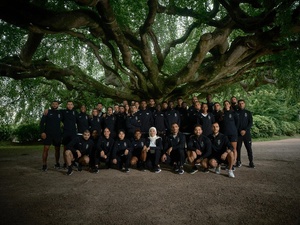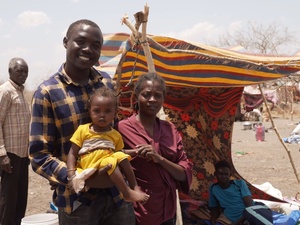Chad: new arrivals of Sudanese reported
Chad: new arrivals of Sudanese reported
UNHCR teams in Eastern Chad are monitoring the border region with Sudan amid reports that another 18,000 Sudanese refugees have crossed into Chad in the past week following heavy fighting in the Darfur region. The new refugee arrivals are reported at several locations - along the northern segment of the affected border zone near Koulbous, Birak and Djoran, and along the southern segment of the border around Tisi, Ade and Goz-Beida.
Local authorities report that approximately 2,500 people arrived in the surroundings of Waddi Sandi located north of Koulbous, 23 kilometres from the border. According to refugees interviewed by UNHCR, Sudanese forces attacked ten villages in the canton of Djerbira in the early morning hours of last Friday (January 16). The refugees said the troops burned houses and dynamited wells, provoking an exodus by villagers across the border. Most of the refugees fled immediately when the attack started on Friday and did not have time to take anything with them, they said. Some of the women reported that their husbands stayed behind in Sudan. While some of the refugees say they were themselves victims of the attacks, others left as soon as they heard shooting in nearby villages. They said they have no hope at this point of going back anytime soon to Darfur as their homes have been destroyed and they fear for their lives if they return.
The 2,500 people are scattered along a 20-30 kilometre stretch of a sandy river bed, where they have built makeshift shelters out of branches. One of the main problems of this location is the lack of access to water. UNHCR teams report that in the past two days, some groups of refugees have started to leave the site and head further inside Chad to Ogona. The local authorities have identified a temporary site near Ogona where the refugees can have access to wells for water. Refugees, mainly women, children and old people, are travelling to Ogona on donkeys.
Today, the UNHCR team will go to Andou, a village located between Waddi Sandi and Tine to monitor the number of new arrivals there and assess the needs of the refugees.
Local authorities in Guéréda reported that another group of approximately 4,000 Sudanese refugees arrived in the area of Birak at the beginning of the week. The local authorities have allocated an open field some five km from Birak for the newly arrived refugees.
In Djoran, 13 kilometres from Birak, another 1,315 people arrived in the past week. They walked or came on donkeys from the villages of Habsourd and Berseliba, through the mountains of Hadja Mothahim, and crossed the border at Korok.
Further south, the local authorities in Abéché informed UNHCR on Wednesday morning of the arrival of an estimated 10,000 Sudanese in the region of Tisi, Ade and Goz-Beida this week. A UNHCR team will be dispatched on the ground next week together with members of the NGO Africare to evaluate the situation and identify sites for the refugees.
UNHCR teams continue to urgently assess the immediate needs of the refugees and collect more detailed information on the total number of people who crossed over in Chad. The local governmental agency CNAR (Commission nationale d'Accueil et de Réinsertion des Réfugiés), in coordination with UNHCR, is deploying teams at the border to immediately register new arrivals.
UNHCR is pre-positioning blankets, jerry cans and food in Guéréda. UNHCR and WFP are working closely together to deliver food to 15,000 refugees (5,000 in Tine area, 5,000 in Birak area and 5,000 in Ade/Tisi area). Distribution of sorghum, white beans and corn soya blend is scheduled to start at the beginning of next week.
Meanwhile, relocation of refugees from the volatile border zone to Farchana camp further inland is still underway. So far, 621 people have been transferred in the first three relocation movements last Saturday, Monday and Wednesday from Wandalou, near Adré. The next convoy is planned for Sunday. Convoys will continue every other day, moving an average of 250 people each time. Farchana camp will eventually host between 9,000 and 12,000 people.
At the same time, the site of Kouloungo, near Guéréda, has been approved as a relocation site for refugees. UNHCR's partner GTZ will start installations in the camp next week. The camp will host up to 8,000 people. Two other sites are also being evaluated as possible relocation camp sites. Saranh, East of Iriba, could host between 15,000 to 20,000 people, and Hodj, west of Guéréda, could host up to 15,000 refugees.









